PA Health Policy Update for January 12
The following is an update of selected state health policy developments in Pennsylvania from January 8 – 12. (Some of the language used below is taken directly from state documents).
General Assembly
- The state House of Representatives and Senate have released their respective FY 2024-2025 budget hearing schedules. Find the House Appropriations Committee’s schedule here and the Senate Appropriations Committee’s schedule here.
Department of Human Services
- The Department of Human Services (DHS) has issued a Medical Assistance Bulletin to inform providers that, effective February 1, 2024, doulas may enroll in the Medical Assistance (MA) Program, which will enable MA managed care organizations (MCOs) to enter into network agreements with doulas. The bulletin also contains information on provider enrollment.
- DHS has released an updated Medicaid Managed Care Organization (MCO) Directory.
- DHS has updated its calendar of mailing dates for Remittance Advices and corresponding electronic transfers and checks through February 2024. Find the updated calendar here.
Department of Health
DOH has requested input from stakeholders on what the state’s priorities should be for its Title V Maternal and Child Health Services Block Grant, which is intended to improve the health and wellbeing of mothers, infants, children, and youth, including children and youth with special health care needs, and their families. Interested stakeholders can find additional information and details on how to submit feedback here.
Board of Nursing
The State Board of Nursing, along with DHS and DOH, has issued a joint statement of policy to clarify nursing standards and qualifications in the commonwealth for licensed practical nurses (LPNs) and registered nurses (RNs) as it relates to the Nurse Licensure Compact (NLC). Find additional information in this Pennsylvania Bulletin notice.
Insurance Department
The Pennsylvania Insurance Department (PID) has announced the establishment of a state-administered independent appeal process that allows Pennsylvanians to submit for an independent external review if they believe their insurer wrongly denied a claim for covering medical service, treatment, or other items. This is part of Act 146 of 2022, which reformed the state’s prior authorization and step therapy procedures.
PID has also announced that Pennie’s open enrollment period for 2024 health care coverage will be extended until January 19. Pennie is Pennsylvania’s official health insurance marketplace.
Department of Drug & Alcohol Programs
The Department of Drug & Alcohol Programs (DDAP) has announced the Drug-Free Communities Program, which provides community coalitions with grant funding for substance use prevention efforts, will release its FY 2024 notice of funding opportunities on www.grants.gov in February 2024.
Pennsylvania Health Care Cost Containment Council
The Pennsylvania Health Care Cost Containment Council (PHC4) has released a new report – COVID-19, The Impact on Health Care in Pennsylvania – examining how the coronavirus pandemic affected Pennsylvania and its health care system. Find additional information in this press release issued by PHC4.
Medicaid Continuous Coverage Unwinding
DHS is maintaining an online dashboard with Medicaid continuous coverage unwinding data. The data on this dashboard tracks the renewal process by county and zip code. Additional updates and resources about the Medicaid eligibility renewal process may be found here.
DHS has published the following resources to help providers educate patients about Medicaid renewals and what to do if they are no longer eligible for Medicaid.
Stakeholder Events
DHS – Consumer Subcommittee of the MAAC – January 24
The Consumer Subcommittee of the Medical Assistance Advisory Committee (MAAC) will be held on Wednesday, January 24 at 1:00 p.m. Find details on how to participate here.
DHS – Medical Assistance Advisory Committee – January 25
The MAAC will hold a public meeting on Thursday, January 25 at 10:00 a.m. The meeting will be held virtually. Find details on how to participate here.
Patient Safety Authority – January 25
The Patient Safety Authority has announced that it will hold a virtual public meeting on Thursday, January 25 at 1:00 p.m. Additional details on how to participate can be found in this Pennsylvania Bulletin notice.
DOH – Special Pharmaceutical Benefits Program Advisory Council – January 25
The state-wide Special Pharmaceutical Benefits Program (SPBP) Advisory Council will hold a public meeting on Thursday, January 25 from 10:00 a.m. to 12:00 p.m. Find additional information and details on how to participate in this Pennsylvania Bulletin notice.






 Governor Wolf
Governor Wolf Proposed State FY 2023 Budget
Proposed State FY 2023 Budget General Assembly
General Assembly Included in this month’s issue are articles about:
Included in this month’s issue are articles about: Included in this month’s edition are articles about:
Included in this month’s edition are articles about: